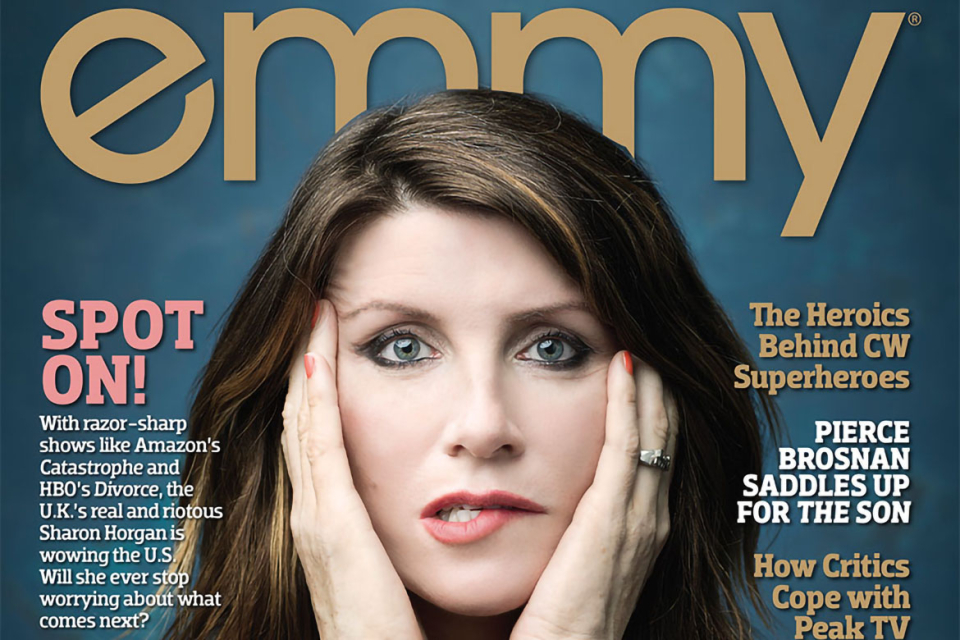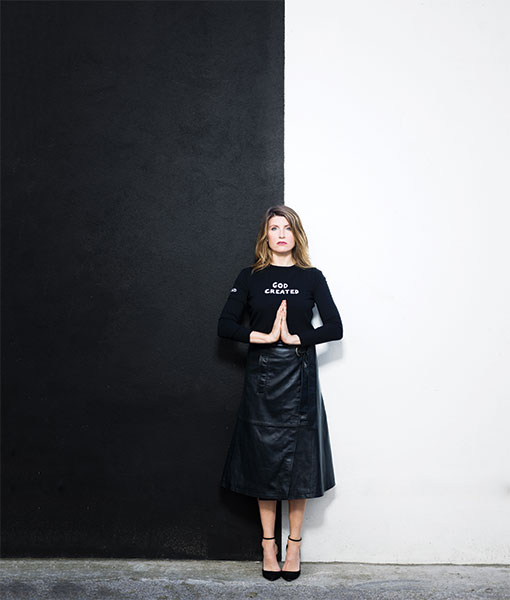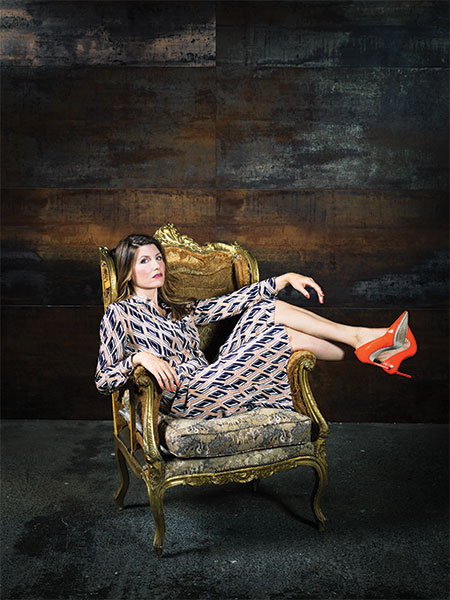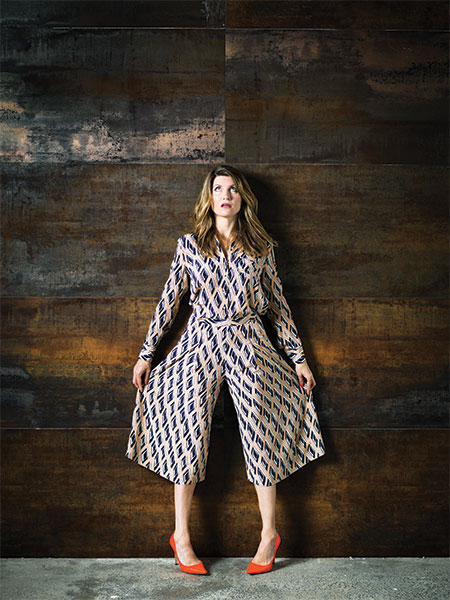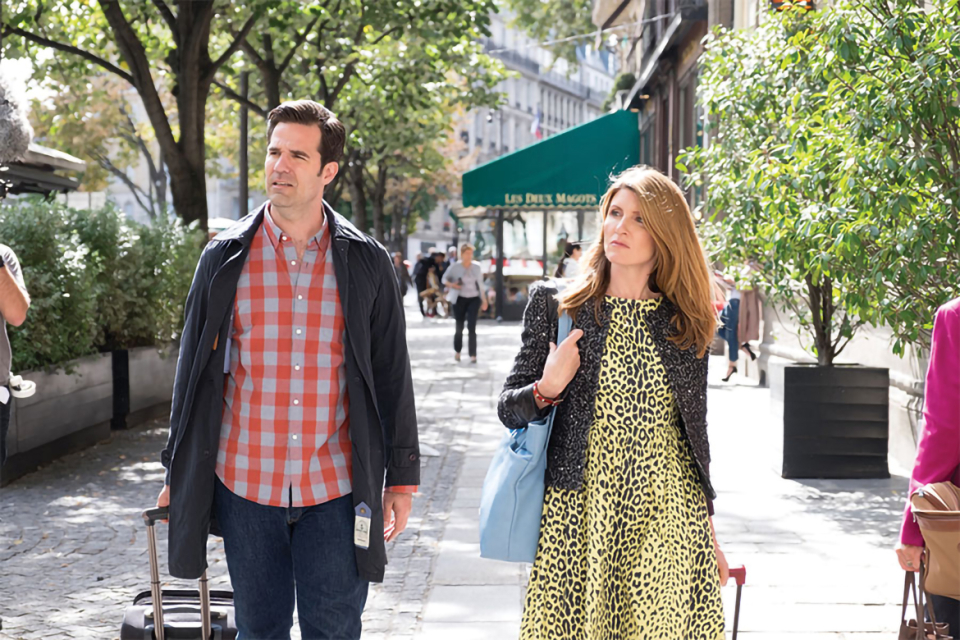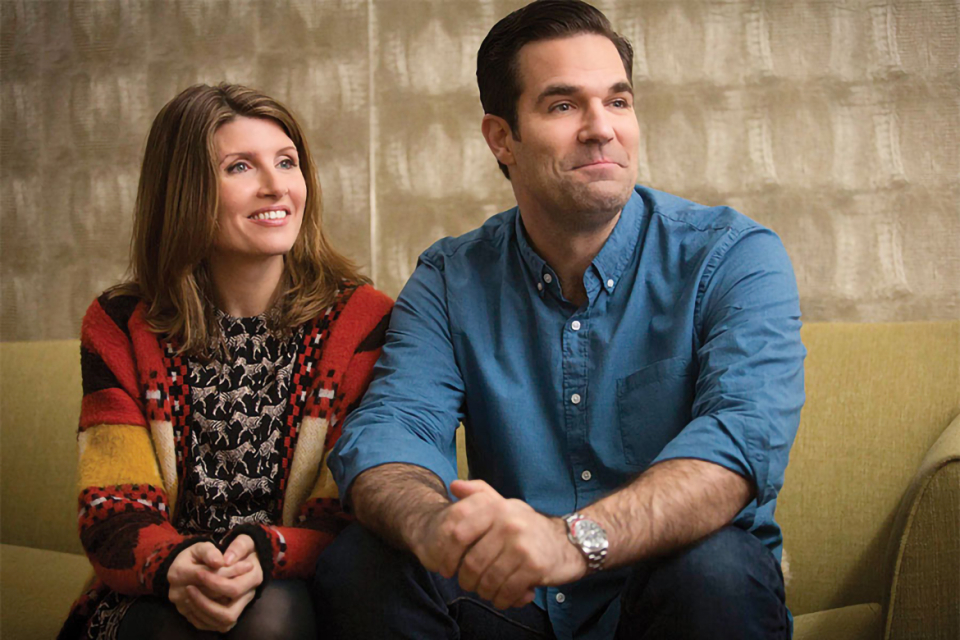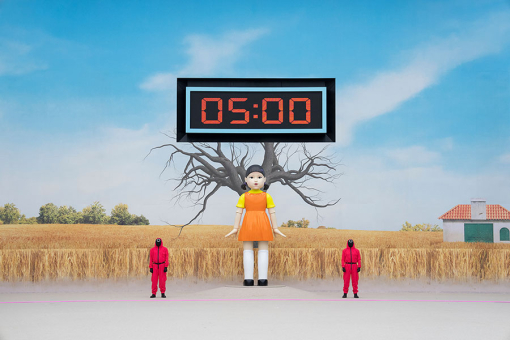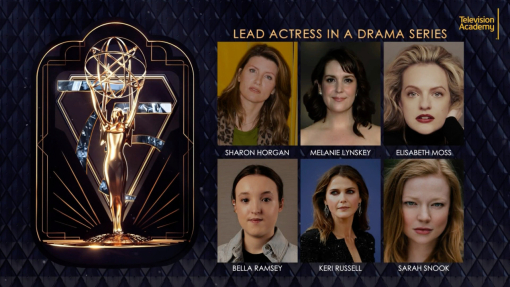My breakfast guest is here early, and the host says I will find her at the bar.
At this central London brasserie, Sharon Horgan is not hard to spot. And it’s not because of the way she’s dressed, though in a leopard print coat, suede ankle boots and a spiffy camel sweater emblazoned with “The Slits,” she is comfortably the coolest person in the room.
No, it’s because Horgan is hammering at a laptop, filling the four or possibly five minutes’ downtime she has this morning with a burst of impromptu work.
“I couldn’t sit there and just read the paper,” says the actor-writer-producer as we’re led to our table. “I mean, I’m really lazy — I love doing nothing. But after a while it makes me a little panicky. I think, ‘Shit, I’ve got stuff to do, and I’ve got a few minutes. I better go over a script.’ It’s good because it keeps me thinking.”
A lot of important people in television — from HBO to Amazon to Channel 4 in the U.K. — need Sharon Horgan to keep thinking. That’s because her thoughts have blossomed into some of the best TV comedies of recent years. Horgan’s voice — honest, harsh and hilarious — has become a chronicle of modern womanhood; she is a virtuoso of abject failure who has, by and by, become a huge success.
We meet the morning after the U.K. launch of the third season of Catastrophe, her and Rob Delaney’s hit Amazon comedy about new parents in a tailspin (the new season debuts Stateside on April 28). She’s also devising the second season of Divorce, the HBO comedy about a marriage in a nosedive that lured star Sarah Jessica Parker back to series television.
On the laptop she’s just snapped shut in front of me were notes for Motherland, another prickly comedy about addled moms whose pilot was madly successful in the U.K. last year.
And that, as they might say in Horgan’s birthplace — east London — ain’t the half of it. She is writing a series to follow another U.K. pilot called The Circuit, about disastrous dinner parties, with playwright Dennis Kelly, her original collaborator on the BBC3 cult classic Pulling.
She has her own production company, Merman, which has just wrapped a series with producer-director David Cross, called Bliss, about a bigamous travel writer juggling two families. A fourth season of Catastrophe — which Horgan and Delaney created, star in and executive-produce — has already been ordered.
And then there’s the small matter of a feature film she’s written for Reese Witherspoon’s production company.
“The thing about Sharon,” says Amy Gravitt, HBO’s executive vice-president of programming, “is that she is incredibly prolific. For every show that exists out in the world, she’s got a dozen other ideas — and all of them seem like they could be their own series.”
And that is why Sharon Horgan is working before breakfast.
This low-level paranoia — or fierce work ethic, depending on your slant — is just one reason for Horgan’s success. Mostly, she’s just really funny, with a loud, filthy and ultimately irresistible laugh that can erupt at any moment.
Not every person who makes others laugh is also a laugher, which leads to reason two: people like Sharon Horgan, and therefore they want to work with her. HBO had been scouting for projects for her for nearly a decade before they went to her to write Divorce; she met Rob Delaney over Twitter.
There’s a third thing, too: Horgan is not merely a fount of ideas but a facilitator. She gets things done.
“We met in a youth theater, and we did a play together,” Dennis Kelly says. Horgan was trying to make it as an actress in London at the time. “About two years later I bumped into her in a pub and told her I’d written a play. She said, ‘Can you show it to me?’ — she was first to see it — and then I got a call saying, ‘Let’s put it on.’ I would have done none of that without her. Sharon was brilliant at saying, ‘Let’s do this.’”
It took Horgan a little more time to work out exactly what the this was that she wanted to do. She bridles at being called a late starter — “Yes, it took me a while to get things moving, but I’m not a geriatric” — but admits that “maybe I messed around for a decade longer than I should have.”
But the messing around — “doing jobs we hated, drinking and making fools of ourselves,” as Kelly puts it — was at least all put to good use. Pulling, Horgan and Kelly’s tale of 20-somethings making mistakes in love and life, in which she also starred, was an instant classic, even though it only lasted two seasons on the BBC.
It was “literally just our lives put into different bodies,” she says of the show. There was outcry from fans when it was canceled; various U.S. studios have been trying, and failing, to make a version ever since.
Pulling brought Horgan two BAFTA nominations and two British Comedy Awards and got her noticed in America. Over the next few years, she sold three pilots with her writing partner, comic Holly Walsh, but none went to series. One in particular, called Bad Moms, taught her a lesson she hasn’t forgotten.
“It didn’t work because we weren’t able to do what we wanted to do. On network TV, they won’t let you show a failing mother. What I would find funny and real and dark, they would see as neglectful and therefore very off-putting.”
Still, making pilots that never go to series can be a sufficiently fruitful career in itself. Around 2011, a network (she won’t say which one) offered her a two-project deal, which to a woman with two young children and a husband who had just left his job for a career change must have been sorely tempting.
“I was on holiday with my family, and it was a real fork-in-the-road kind of situation,” she recalls. “I thought, ‘That’s quite a lot of money - but if I do that, it could be the end.’”
The end, she means, of making the sort of shows she wanted to do — the funny, real, dark ones about people failing — shows, basically, like Pulling.
“It’s weird because during that same holiday, I first started having conversations about Motherland with Holly [Walsh] and Graham [Linehan, the Irish writer-director known for the Channel 4 sitcom The IT Crowd] . So maybe there were a few little things that were bubbling along and I thought, ‘I just need to trust myself that I can make something happen.’
“I turned to my husband and said, ‘I’ve decided to turn down the deal,’ and he obviously said, ‘ What? Why?’ I said, ‘I think I know what I’m doing. Trust me. It’s gonna be okay.’”
She laughs again, the sort of nervous expulsion that says she had no idea whether it would in fact be okay. As it’s turned out, things have gone considerably better than okay. Her rejection of a network deal has been the making of her.
Horgan’s success with Catastrophe (she and Delaney were Emmy-nominated last year for outstanding writing in a comedy) and, now, Divorce stems from her own wit and worldview, as well as those of her collaborators. But it’s also true that the TV comedy has finally caught up with Sharon Horgan.
What she calls the “network view” of the world — “where you have to tell your audience that everything’s okay all the time” — has been at least partially supplanted by the cable, and now internet, views of the world. People like Horgan get to tell the stories they want to tell; it is now acceptable for female characters to make mistakes.
“And thank God!” she says. “Otherwise it would have been a real old hard slog.”
Read the rest of our article on Sharon Horgan in the latest issue of emmy magazine, on sale March 21.

